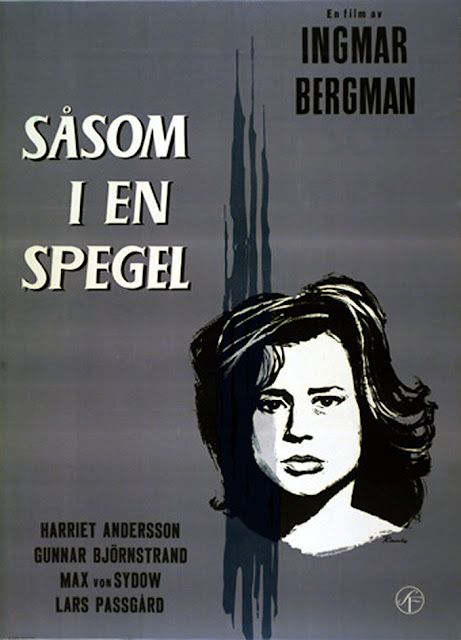☆ ☆ ☆ ☆ ½
Through
A Glass Darkly (1961) – I. Bergman
At first glance, this appears to be a
simple (sad) story, simply told, from Ingmar Bergman and his team: A young woman (Harriet Andersson) slips back
into psychosis after returning home from the mental hospital. Andersson is truly impressive as her
character Karin begins to lose her grip on reality and, in a lucid moment, declares
that she must choose which world to live in -- but the only choice seems to be
the world of voices where God (or a horrifying spider?) might open a door to
grace us at any moment. But the film is
richer than just a straightforward detailing of a descent into madness – we also
see the ramifications for her immediately family (husband Max von Sydow, father
Gunnar Björnstrand, and brother Lars Passgård).
Her father is the Bergman surrogate, a writer who has been utilising his
daughter’s trauma for his own work, feeling guilty about it, avoidant of the
situation (but perhaps drained by having to confront similar issues with his
late wife). Bergman hints at his typical
theme of the artist’s role in society (and their burdens) – but he may be
ashamed of his own mining of his close relationships for film and theatre
scripts. The husband is portrayed as fatalistic
and helpless, supportive but unable to cope – he offers one angry outburst at
the father’s neglect and selfishness but otherwise accepts affairs as they are.
The brother is the most vulnerable,
unable to escape his sister’s orbit, already full of self-loathing and shyness,
and possibly harmed psychologically by his sister’s actions and his father’s
absence and avoidance. Sven Nykvist’s
cinematography uses lots of natural light -- the outdoor scenes on Fårö can be
beautiful, the indoor scenes occasionally surreal and haunting. The end result
is horror, played out as a chamber piece, where the question hanging in the air
is “why?” Why does God let this happen? Why do we continue with life in the
face of such horror? The father’s suggestion that the existence of love is the
reason for us to persist does not feel entirely convincing (or at least Bergman
does not seem entirely convinced). But
perhaps it is genuinely true that we are sustained in this life by our friends,
family, and loved ones, and thus we fight on.
But the darkness can be pretty dark.

No comments:
Post a Comment